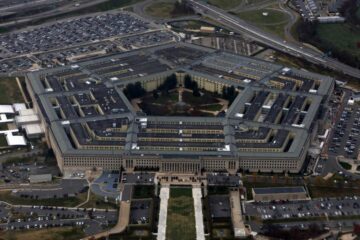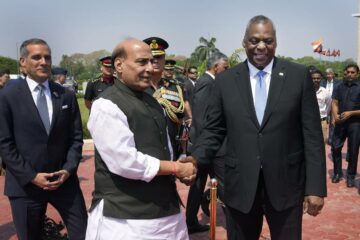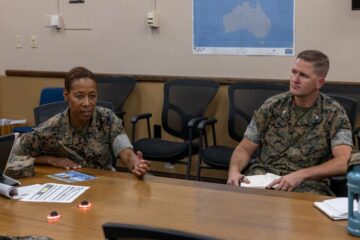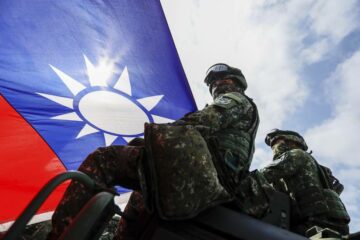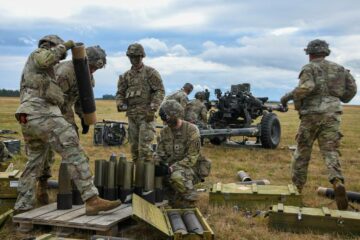
The U.S. Army is poised to be the largest player in the first round of Replicator projects, according to the service’s top acquisition official.
Doug Bush, assistant secretary of the Army for acquisition, logistics and technology, told an audience at the Ronald Reagan Institute’s National Security Innovation Base Summit in Washington that the Pentagon selected a system the service proposed for the initial tranche of Replicator — an effort to field thousands of drones and other autonomous systems over a two-year period.
“We’re the biggest participant in terms of what’s actually going to come out of round one in terms of quantity,” he said March 20.
The Pentagon hasn’t revealed which systems it has selected for Replicator and Bush refused to discuss details about the Army effort he referenced. DefenseScoop reported in February that the service proposed AeroVironment’s Switchblade 600 for the effort.
Air Force Vice Chief Gen. James Slife, who spoke on a panel with Bush, said the service has ideas for future Replicator proposal rounds, but those efforts weren’t ready for the first tranche.
“The Air Force has got several compelling programs in the pipeline that could be considered,” he said. “They’re not quite as technologically mature as some of the army programs that are going to be in round one.”
Deputy Defense Secretary Kathleen Hicks unveiled Replicator last August, and the department has since requested $1 billion from Congress to execute the program fiscal 2024 and 2025. While the initial focus is on autonomy, the effort’s broader goal is for Replicator to become a repeatable process the Pentagon can use to push a range of capabilities to military users.
To do this, the department is funneling money toward existing programs to either help them move faster or ramp up production quantities and is selecting new efforts proposed by the military services.
A March 19 report from the Reagan Institute praised the department’s pursuit of Replicator and recommended full funding for the effort, but highlighted broader concerns with the Pentagon’s ability to translate U.S. innovation into national security capabilities.
“There has been a lot of activity in the last year as it relates to national security innovation, as it relates to harnessing and capturing that innovation for our national security goals,” Rachel Hoff, policy director at the Reagan Institute, told reporters ahead of the report’s release. “That activity has not necessarily translated into progress.”
Mac Thornberry, former chairman of the House Armed Services Committee and now a member of the Pentagon’s Defense Innovation Board, said the high-level leadership Hicks has put behind Replicator is a sign of progress within the Pentagon.
“To me, the most amazing thing about Replicator is the deputy secretary put it on her shoulders to say, ‘I’m responsible for this,’” he said during the conference. “It’s like a pass-fail on herself. And that sort of accountability is exactly the sort of thing we need to change the culture, to take more risks.”
Courtney Albon is C4ISRNET’s space and emerging technology reporter. She has covered the U.S. military since 2012, with a focus on the Air Force and Space Force. She has reported on some of the Defense Department’s most significant acquisition, budget and policy challenges.
- SEO Powered Content & PR Distribution. Get Amplified Today.
- PlatoData.Network Vertical Generative Ai. Empower Yourself. Access Here.
- PlatoAiStream. Web3 Intelligence. Knowledge Amplified. Access Here.
- PlatoESG. Carbon, CleanTech, Energy, Environment, Solar, Waste Management. Access Here.
- PlatoHealth. Biotech and Clinical Trials Intelligence. Access Here.
- Source: https://www.defensenews.com/unmanned/2024/03/20/first-round-of-replicator-to-heavily-feature-army-systems-bush-says/
- :has
- :is
- :not
- $1 billion
- $UP
- 10
- 19
- 20
- 2012
- 2024
- 2025
- 70
- a
- ability
- About
- According
- accountability
- acquisition
- activity
- actually
- ahead
- AIR
- Air Force
- amazing
- an
- and
- ARE
- armed
- Army
- AS
- Assistant
- At
- audience
- AUGUST
- autonomous
- autonomous systems
- Autonomy
- base
- BE
- become
- been
- behind
- Biggest
- Billion
- board
- broader
- budget
- but
- by
- CAN
- capabilities
- Capturing
- chairman
- challenges
- change
- chief
- come
- committee
- compelling
- Concerns
- Conference
- Congress
- considered
- could
- covered
- Culture
- Defense
- Department
- deputy
- details
- Director
- discuss
- do
- during
- effort
- efforts
- either
- emerging
- Emerging Technology
- Ether (ETH)
- exactly
- execute
- existing
- faster
- Feature
- February
- field
- First
- Fiscal
- Focus
- For
- Force
- Former
- from
- full
- funding
- future
- Gen
- Goals
- going
- got
- Harnessing
- he
- heavily
- help
- her
- high-level
- Highlighted
- House
- HTTPS
- ideas
- images
- in
- initial
- Innovation
- Institute
- into
- IT
- james
- jpg
- largest
- Last
- Last Year
- Leadership
- like
- logistics
- Lot
- March
- mature
- me
- member
- Military
- money
- more
- most
- move
- National
- national security
- necessarily
- Need
- New
- now
- of
- official
- on
- ONE
- or
- Other
- our
- out
- over
- panel
- participant
- pentagon
- period
- pipeline
- plato
- Plato Data Intelligence
- PlatoData
- player
- poised
- policy
- Praised
- process
- Production
- Program
- Programs
- Progress
- projects
- proposal
- proposed
- pursuit
- Push
- put
- quantities
- quantity
- quite
- Ramp
- range
- ready
- recommended
- referenced
- relates
- release
- repeatable
- report
- Reported
- reporter
- responsible
- Revealed
- risks
- round
- rounds
- s
- Said
- say
- says
- secretary
- security
- selected
- selecting
- service
- Services
- several
- she
- shoulders
- sign
- significant
- since
- some
- sort
- Space
- Space Force
- Summit
- system
- Systems
- Take
- Technology
- terms
- that
- The
- Them
- thing
- this
- those
- thousands
- to
- told
- top
- toward
- translate
- translated
- u.s.
- unveiled
- use
- users
- vice
- washington
- we
- which
- while
- WHO
- with
- within
- year
- zephyrnet


